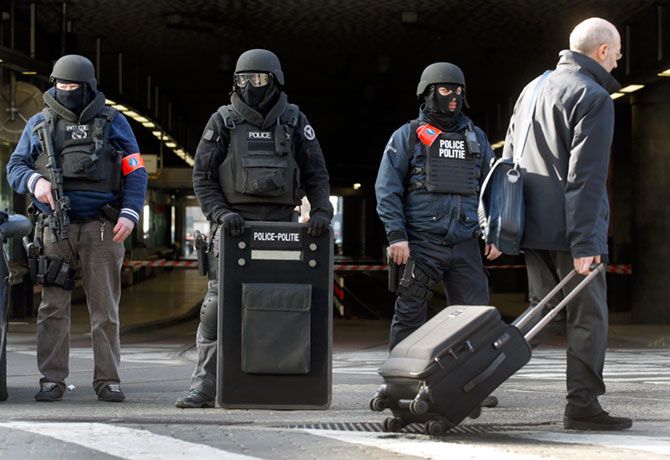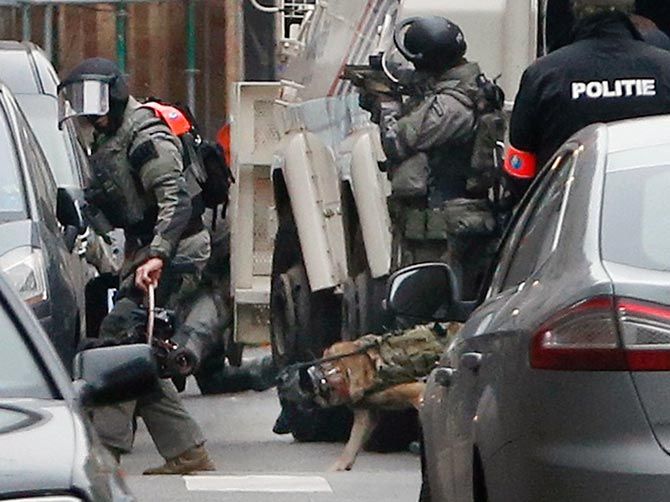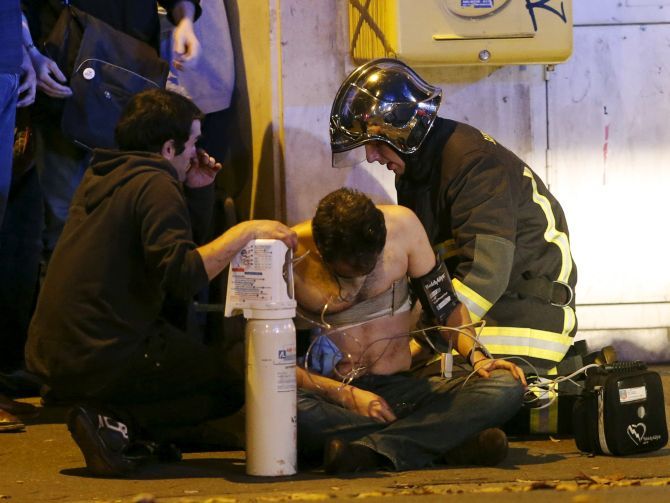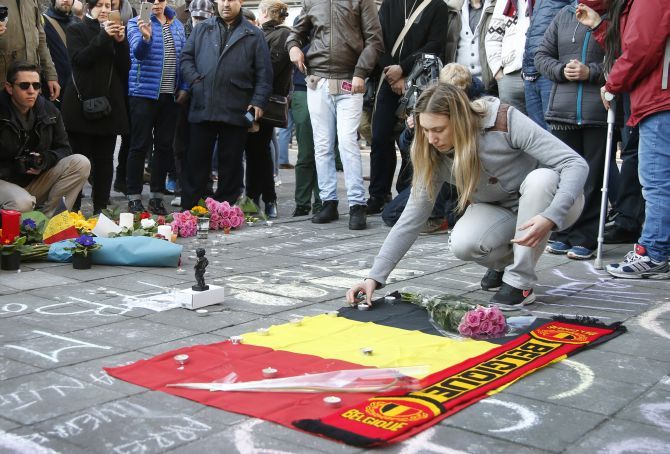The level of preparedness of Daesh sleeper cells is evident from the fact that it took just four days after Salah Abdelslam's arrest to execute the Brussels attacks, says Lieutenant General Syed Ata Hasnain (retd).

The moment Salah Abdelslam, the Moroccan French logistical planner of the ten member Paris attack terror group was shot and captured in Brussels a counterattack from ISIS (Daesh) was imminent. It happened within four days.
Television visuals reveal that the targets were the departure hall of the international airport at Brussels which saw two blasts and a third was at the Molenbeek metro station, thus effectively paralysing the transport system in the Belgian city, creating a virtual lockdown which included closed borders.
The quantum of casualties (34 dead so far) could have been much higher considering the number of people usually concentrated at the departure halls of international airports. The airport is obviously shut, stranding travellers from all over the world. It is a situation akin to any major city under a serious terror attack.
Yet, clearly Brussels appears to be the planning hub of Daesh (ISIS) for its diabolic plans to target Europe. There have been failed attacks ending with the high profile terror event in Paris for which the perpetrators travelled from Belgium.
The Global War against Terror has multiple hubs: From the Middle East to South Asia to Africa. However, the manifestation of classic terror has shifted to Europe. There are reasons for this.
First among the reasons is that the US has adopted stringent measures of homeland security, which has been difficult to penetrate, making it comparatively safe.
Second, the kinetic element of the War was most strongly implemented in the Middle East (and in fact is still continuing) and Afghanistan without fully achieving the desired results. The blowback from this has traveled westwards with Europe becoming the hub.
Europe with its unionisation may have integrated politically, economically and in terms of border controls, but in the form of warfare prevalent today is highly vulnerable from a social angle.
Former European colonial powers in varying states of reducing populations, but higher states of development and quality of life opened themselves up to absorb migrants to make up for the negative population growth.
Most of the migrants came from former colonies with linguistic affinity and were absorbed in low end jobs which were acceptable for that generation in search for better lives. They spawned the next generations who are better educated but unwilling to follow in their footsteps.
Of different colour and ethnicity but born and brought up in the Euro environment the lack of social integration of the second and third generations hurts especially when they are unable to find better jobs.
Frustration levels are high and it is this aspect which has helped ideological groups from the Middle East to take the war to Europe where they find ready recruits to join the cause.
That these migrants are mostly from Islamic nations has helped groups such as Daesh to establish networks. Daesh attracted young recruits on the basis of slick advertising and returned many of them back to Europe where they are now part of virtual sleeper cells all over European cities.

The three Moroccan Abdelslam brothers, who were a part of the ten man squad which struck Paris last year, were residing in Molenbeek, the ghettoised neighbourhood of brooding immigrants where even hardcore policemen think twice before entering.
The level of preparedness of Daesh sleeper cells is evident from the fact that it took no more than four days to execute the aimed retribution and that too in the heart of Europe where the headquarters of the European Union and NATO exist.
The resources are in abundance, both human and material with ideological motivation a constant from Daesh.
The nature of the terrorist attack took the predictable route of targeting the softest of targets any urban centre offers -- the transport system.
The airport departure hall was targeted because that is usually a hub of activity with lower security and un-scanned luggage. Metro infrastructure can hardly ever be protected and its targeting produces even more spectacular results for the terrorists.
Travel and tourism comes to a halt, thus adversely affecting the economy. Entire neighbourhoods come under a security blanket causing discomfort in the lives of the people. Young people, especially migrants, are picked up by intelligence sleuths on the basis of religious and ethnic profiling, leading to cleavages in the process of integration.
Some clerics will pay lip service in condemnation, others will exploit the situation to garner support for themselves, preach negativity to the youth and you have the makings of the causes for the next terror attack.
This cycle of activity is what is most desired by terror groups as it creates antipathy and ripples of dissatisfaction and mistrust.
Some years ago I visited Brussels. The beauty of the architectural marvel that is the city centre and the delightful Mediterranean restaurants near the Central Square can hardly be enjoyed in the face of gangs of migrants from the Middle East and North Africa. They harass and intimidate tourists as a demonstration of their power with the police remaining unmoved.
In fact, this is reportedly one of the major problems because Brussels is itself divided into numerous police districts where cooperation between the Flemish and French speakers is minimal, thus losing out on intelligence.
A large segment of the approximately 25 percent Muslim population in Brussels lives out of neighbourhoods like Molenbeek which has now acquired notoriety as the hub of the planning for the Paris terror attacks.
Belgium has a migrant population of 26 percent. Eight percent of the total is Muslim and increasing.

Where does this take us in the Global War on Terrorism? Is the world losing the War?
Such ideological wars -- which are given impetus and body by social issues such as migration, lack of integration of ethnic and religious minorities and continuous attempts to radicalise -- are not fought over a few years, but over generations.
The US termed this confrontation as 'The Long War,' which was most apt. Long Wars requires stamina, patience, resilience and resources. That is the challenge. They need to be tackled comprehensively in different dimensions and not by kinetic methods alone. This has been adequately learnt from the disastrous experience of Afghanistan and Iraq.
Intellectual examination of Islamic ideology and philosophy has been ongoing in outstanding think-tanks in the US, the UK and other Western countries, but it is at the implementation stage that things get unstuck.
There is no doubt that evil organizations like Daesh and its associates in the Middle East need to be physically eliminated, but more important it is the narrative of confrontation which has to be removed from the minds of the followers of Radical Islam.

The ongoing migrant crisis in Europe, whose roots lie in the Middle East and Afghanistan (many of the migrants are Afghan), is not going to be helpful towards the resolution of the identified problems.
Already, Sweden has decided to expel illegal migrants and most countries are unwilling to take in Muslims. Donald Trump's rants and Trumpism's plodding ways contribute further to alienation.
Germany, which accepted more than its share of migrants, faced major social problems on new year's eve, diluting the popularity of as effective and strong a leader as Angela Merkel. The political implications of the migrant issue cannot be wished away and the situation is building towards eruption.
The careful crafted and maneuvered integration of Europe is now under threat with individual national border controls affecting movement of goods and people. Schengen is under threat and that means the charm of Europe's spring and summer is under threat from a no show by international tourists.
Terrorism targets almost everything.
Solutions are far and few. Better intelligence and more sharing, more stringent access control to potentially soft targets and control of people's movement. These are essentially tactical measures.
The strategic lie in changing minds, convincing the dispossessed and most importantly, managing violence levels in faraway core centres like Syria and Afghanistan. That is unlikely to happen anytime so soon.
Lastly, Europe could look at the Indian model of integration of minorities. While it is accepted that the Indian minorities are far from being migrants, the tolerance levels (also under debate) are high despite some incidents. Integration is an ongoing process and far from complete or perfect.
If Europe has to overcome its problems of integration respect for social diversity will have to become its guiding mantra. Its close protection of the high quality of life it gives its people must include diversification and deliberate outreach.
It is not easy in the face of threats that it faces.
Lieutenant General Syed Ata Hasnain (retd) is associated with the Vivekanand International Foundation and the Delhi Policy Group.











 © 2025
© 2025